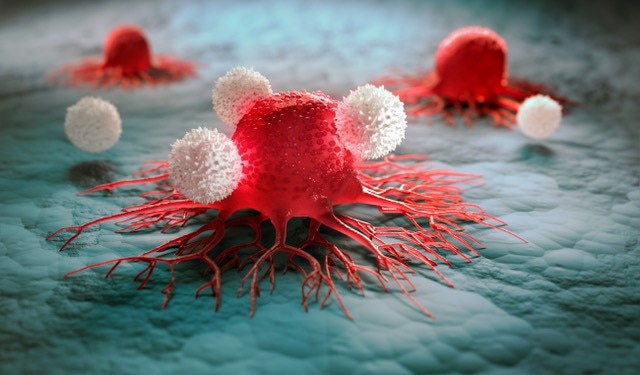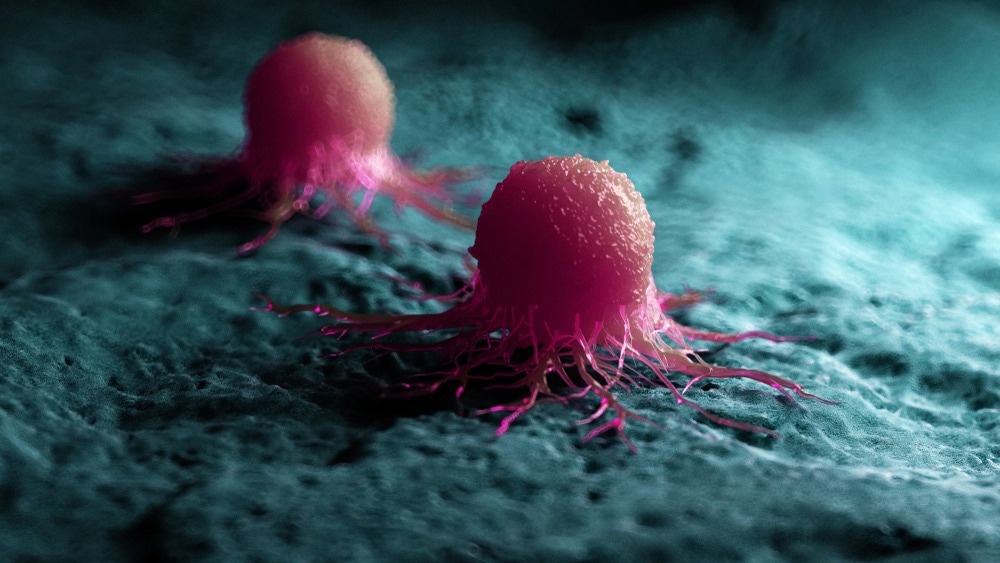Reviewed by Danielle Ellis, B.Sc.Jan 30 2024
Every human cell has class I major histocompatibility complex (MHC) molecules on its surface, which are immune complexes. The immune system needs MHC class I molecules to identify and eradicate cancer.
 Artistic rendition of CD8+ T cells (white) attacking cancer cells (red). Image Credit: peterschreiber.media/ Shutterstock
Artistic rendition of CD8+ T cells (white) attacking cancer cells (red). Image Credit: peterschreiber.media/ Shutterstock
To avoid being detected by CD8+ T cells, the immune system's main cancer-fighting cells, cancer cells actively decrease their MHC class I molecules in response to immune system pressure.
Technology to robustly augment the amount of MHC class I in cancer cells has been developed by researchers in the United States and Japan, led by Dr Paul de Figueiredo, NEXTGEN Precision Health Endowed Professor at the University of Missouri and Principal Investigator for the Bond LSC, Professor Koichi Kobayashi of Hokkaido University and Texas A&M Health Center.
This breakthrough - which enhances the immune system's capacity to identify and eradicate cancer cells - was released in the Proceedings of the National Academy of Sciences journal.
Our discovery has the potential to transform the way we approach cancer treatment. Our technology enables us to specifically target immune responsive genes and activate the immune system against cancer cells, offering hope to those who are resistant to current immunotherapy.”
Koichi Kobayashi, Professor, Hokkaido University
A gene known as NLRC5 was previously discovered by Kobayashi and his colleagues to control MHC class I levels. They also discovered that NLRC5 is inhibited by reducing MHC class I levels by disabling molecular switches that are present on cancerous DNA through a process known as DNA methylation.

Image Credit: SciePro/Shutterstock.com
Their TRED-I (Targeted Reactivation and Demethylation for MHC-I) system was able to further activate NLRC5 and restore DNA methylation of the NLRC5 gene, increasing MHC class I levels in cancer without having a significant negative impact.
New modalities for fighting cancer like this are desperately needed because we have few solutions to fight some cancer types. This is a radically new approach, and I’ve felt lucky to be part of it.”
Dr Paul de Figueiredo, Professor and Principal Investigator, University of Missouri
Models of cancer in animals were used to test TRED-I. It dramatically shrank the size of the tumors and boosted the production of cytotoxic CD8+ T cells. When TRED-I was combined with the current immunotherapy, the effectiveness of the treatment was significantly increased.
Surprisingly, the TRED-I system showed promise for treating metastasized cancers by being effective for the tumor that was located far from the original target tumor.
This work is the culmination of our team’s research over the past decade. It’s great to shed light on moving our findings to potential clinical applications. We believe with further refinement, the TRED-I system could contribute significantly to cancer therapy.”
Koichi Kobayashi, Professor, Hokkaido University
The goal of future research is to enable the TRED-I system to be delivered directly to cancer patients. These medications have the potential to boost both the immune system's ability to eradicate cancer and the body’s reaction to current treatments.